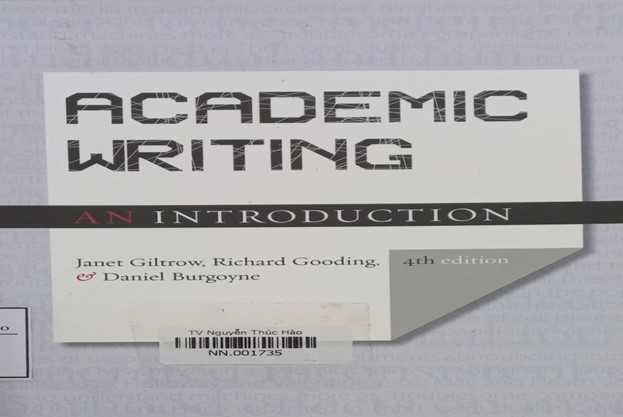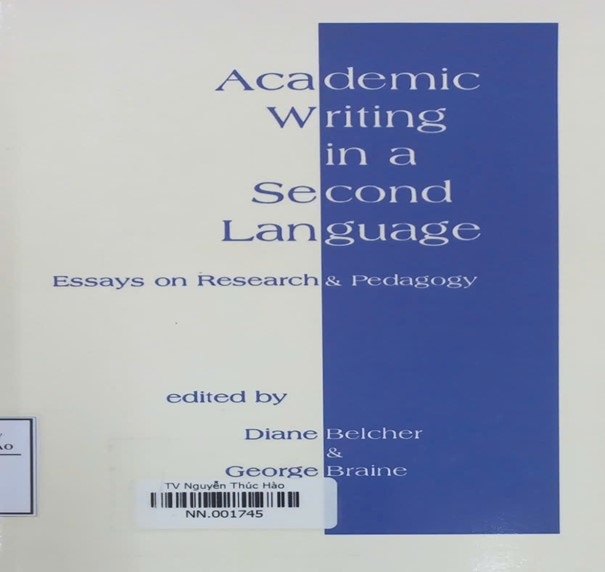In the new book introduction section,
Nguyen Thuc Hao information center and library would
like to introduce to readers two English books which are related to writing
skills. These books are useful sources
of reference, learning and teaching materials for teachers and students.
The readers who are interested
in, can go to Nguyen Thuc Hao information
center and library
(5th Floor – The Foreign books reading room) to be served. Below is
some information about these two books:
1. Academic
Writing: An Introduction - Fourth Edition
By: Janet Giltrow, Richard Gooding, Daniel Burgoyne
Publisher: Broadview Press; 4th edition (2021) - 392 pages

About the Authors
Janet Giltrow is Professor of English and Associate Dean of Arts at the University
of British Columbia.
Richard Gooding is Assistant Professor of
Teaching in the Department of English at the University of British Columbia.
Daniel Burgoyne is Professor and Chair of
the Department of English at Vancouver Island University.
Introduction
Academic
Writing has been widely acclaimed in all its editions as a superb textbook and
an important contribution to the pedagogy of introducing students to the
conventions of academic writing. The book seeks to introduce student readers to
the lively community of research and writing beyond the classroom, with its
complex interactions, values, and goals. It presents writing from a range of
disciplines in the humanities, social sciences, and natural sciences,
cultivating students’ awareness of the subtle differences in genre.
The
fourth edition has been revised throughout and includes a new chapter on visual
rhetoric, a new section on the academic peer review system, updated examples,
expanded exercises, and new glossary entries.
Review
"Academic Writing: An
Introduction draws on current research in writing studies to
usher students (and teachers) into an accessible but sophisticated overview of
how university readers and writers create knowledge. This textbook demystifies
academic writing by showing students how and why experts make their rhetorical
moves within specific situations. Grounded in genre theory, the text offers
teachers specific disciplinary tools to use to help students learn to read as
well as to write university genres. Packed with examples from genres produced inside
and outside the academy, the text offers rich potential for class discussion,
and for individual or collaborative writing projects that would prepare
students to move into disciplinary research situations (and beyond). Academic Writing is unique because it
goes beyond describing the 'conventions' of research writing to, instead,
richly illustrate what motivates this writing: why scholars cite sources,
conduct peer review, or prefer a nominal style. I highly recommend this text for
teachers who seek to prepare students to conduct research in their fields and
beyond their undergraduate educations." -- Mary Soliday, San Francisco
State University
Praise for previous editions:
"Like any complex rhetorical art, good academic writing
is less a matter of conforming to rules than of exercising judgment, informed
by a sense of audience expectations and developed by disciplined
practice. Academic Writing: An Introduction is
one of those rare guides that knows this, and helps students help themselves.
As students work through the book's many imaginative exercises, they will find
themselves developing a new level of rhetorical judgment. Not only will they be
better equipped to deal with writing assignments in a variety of disciplines;
they will likely go on improving as writers after their introductory course has
been completed." -- Brian Turner, Centre for Academic Writing, University
of Winnipeg
2. Academic Writing in a Second Language: Essays on Research
and Pedagogy.
By: Diane Belcher, George Braine
Publisher:
Ablex Publishing Corporation - Norwood, NJ (1995) - 410 pages.

About the Authors
Diane Belcher is Acting Director of the ESL Composition Program at Ohio
State University. Her reviews and articles on second language writing have
appeared in English for Specific Purposes, The Modern Language Journal, The
Rhetoric Society Quarterly,and other journals.
George Braine is Assistant Professor of English at the University of South
Alabama. He has taught ESL and EFL in Sri Lanka, Oman, and the United States
for over 20 years.
Introduction
The
authors’ aim throughout this volume is to help make the Anglophone
postsecondary academic discourse community feel more “beckoning” than
“threatening” to nonnative speakers of English. All of the contributions to
this volume have been motivated by the authors’ involvement as teachers and
researchers with ESL students and fellow ESL teachers at the authors’ own and
other postsecondary institutions. While it would certainly be gratifying if the
authors’ reflections on academic literacy issues, their research findings, and
their pedagogical suggestions were found to be relevant to the readers’ own
teaching environments, it would be far more gratifying if their volume
encouraged readers to learn more about the wider social contexts in which their
students function after leaving the ESL classrooms.
The
book is divided into three parts: issues, research, and pedagogy. The four
articles under “issues” are among the most stimulating. Schneider and Fujishima
present a representative figure EAP teachers must worry about: the student who
doesn’t improve despite declarative knowledge of the right strategies and
plenty of hard work, and finally has to
leave. The other articles really have to be evaluated in terms of what they
tell us about his situation and what could be done. Leki describes a revealing
investigation of how writing is evaluated, by students, EAP staff, LI
composition teachers, and subject specialists. The very different responses
confirm that literacy is relative and situation/ discipline-specific, and also,
in contrast, that most people think it is absolute and unproblematic. One
problem that students have, therefore, is that literacy strategies successful
in one (US) context fail in another.
Welcome all readers to read and enjoy these
books !
(Hai
Yen - Nguyen
Thuc Hao information center and library)